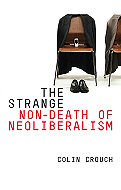|
The Strange Non-Death of Neoliberalism
|
|
Colin Crouch
|

|

The financial crisis of 2008-9 seemed to present a fundamental challenge to neo–liberalism, the body of ideas that have constituted the political orthodoxy of most advanced economies in recent decades. Colin Crouch argues in this book that neo-liberalism will shrug off this challenge. The reason is that although it seems to be about free markets, in practice neo-liberalism is concerned with the dominance over public life of the giant corporation. This has been intensified, not checked, by the financial crisis and by an acceptance that certain financial corporations are ‘too big to fail′. Although much political debate remains preoccupied with conflicts between the market and the state, the impact of the corporation on both these is far more important today.
Several factors have brought us to this situation:
• The lobbying power of firms whose donations are of growing importance to cash–hungry politicians and parties;
• The weakening of competitive forces by firms large enough to shape and dominate their markets;
• The power over public policy exercised by corporations enjoying special relationships with government as they contract to deliver public services;
• The moral initiative that is grasped by enterprises that devise their own agendas of corporate social responsibility.
Democratic politics and the free market are both weakened by these processes, but they are largely inevitable and not always malign. Hope for the future, therefore, cannot lie in suppressing them in order to attain either an economy of pure markets or a socialist society. Rather, it lies in dragging the giant corporation fully into political controversy.
Colin Crouch is Professor of Governance and Public Management at Warwick Business School.
|
|
